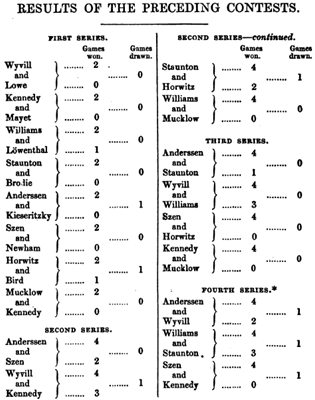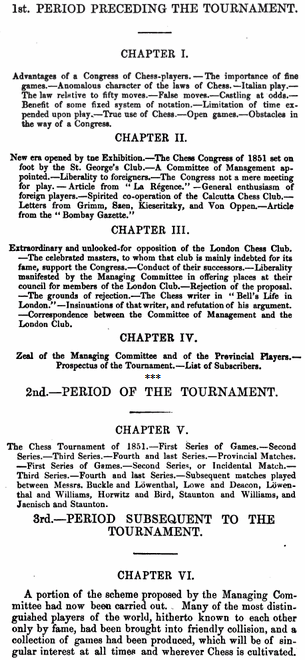In my previous post,
1851 London (on Google Books),
I referenced a digital copy of Staunton's book 'The Chess Tournament', his account of 1851 London, the first international tournament.
Page 174 of the book gives a summary of the matches.

I compared this against my own page on the matches,
1851 London Tournament; London, V-VII, 1851,
and except for a slight problem with one name ('Lowe' vs. 'Loewe E') the basic info was the same.
The same page in the book includes a note:-
In this final section, the match between Anderssen and Wyvill was to decide which took
the First, and which the Second Prize. The next contest, between Williams and Staunton,
was to determine which took the Third, and which the Fourth Prize. The third encounter,
between Szen and Kennedy, was to decide who took the Fifth, and who the Sixth Prize ;
and the Fourth Match, between Horwitz and Mucklow, was to settle their respective right
to the Seventh and Eighth Prize. (This match not being played, in consequence of Mr.
Mucklow's absence, the Committee adjudged Mr. Horwitz entitled to the Seventh Prize, and
awarded the Eighth to Mr. Mucklow.) It is to be regretted that, owing to the arrangements,
which were unavoidably adopted to shorten the duration of the Tourney, most of the chief
players, as Kieseritzky, Szen, Staunton, Loewenthal, Mayet, &c., were precluded from contesting at all for the Second Prize.
That last sentence is curious and indicates that the organizers were not happy afterwards with the tournament's knockout format. Starting with the first round all of the players were paired unseeded.
In that previous post I also referenced a digital copy of the German edition of the tournament book. It turns out that the German version is not a straightforward translation of the English version. It includes ten new pages of introductory material for which Google Translate gives the following as the first sentences of the anonymous 'Forward':-
From the following treatment of the Chess Tournament, the German reading world may be assured that not only all factual and historical facts about the great chess tournament, but also the merely reflecting part of its contents, wherever a clear view guides the hand of the author has, faithfully and completely reproduced. But it must be sincerely known that one believes in terms of the effusion of a cranky vanity and bitterness against alleged contraindications -- a substance to which the famous author attributes only too much space in his mind, as in his book has to deal with the patience of the local audience with care. Regardless, too many of the persistent or hateful ones have been taken up by Staunton's hand. This, however, was not to be avoided partly for the constancy of great injustice and inconvenience, partly in favor of the connexion and the psychological interest.
The German player Anderssen won, while the English player Staunton only finished fourth. Although that translation is far from perfect, the rest of the introduction is worthy of a similar treatment.



